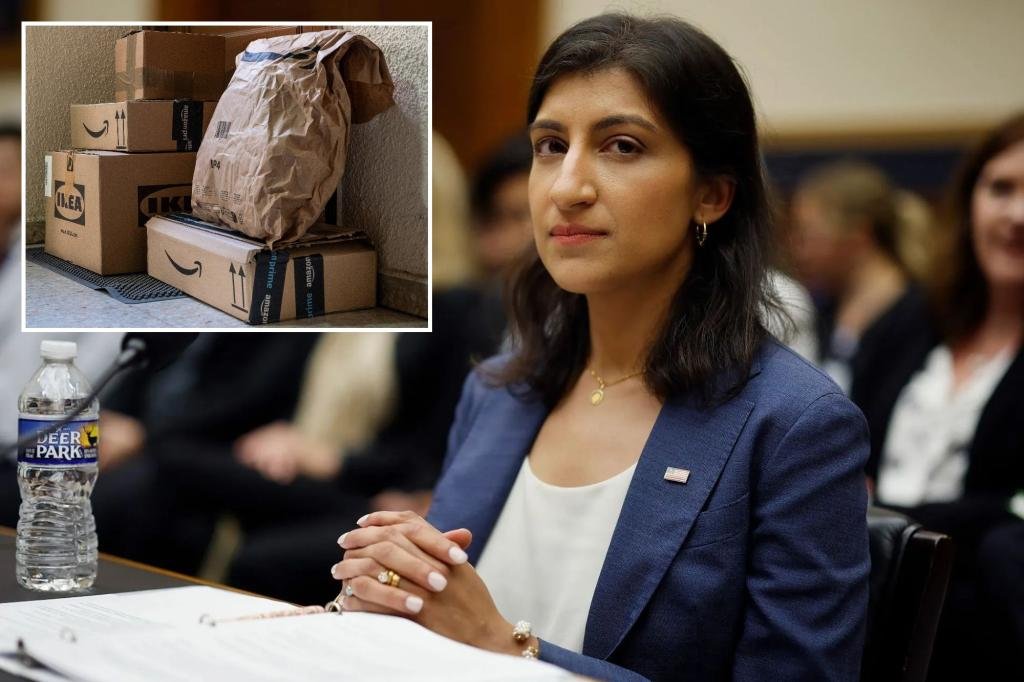Lawsuit From Lina Khan and FTC Against Amazon Poses Potential Threat to Numerous Consumers’ Welfare

The Federal Trade Commission and 17 states have filed a high-profile antitrust lawsuit against Amazon that could force major changes to the popular Amazon Prime service — which would be bad news for its 167 million American members.
Tuesday’s move is hardly surprising.
After all, FTC Chair Lina Khan rose to prominence by calling for antitrust enforcement against Amazon when she was still a Yale University law student and has been a vocal critic of the company ever since.
Unfortunately, the case is reminiscent of Captain Ahab’s doomed pursuit of Moby Dick — it is guided more by desire and ideology than a reasonable assessment of the costs and benefits.
The result will be a wasteful battle all but guaranteed to founder in court.
The agency alleges the tech giant uses data from third-party retailers to bolster its own house brands; leverages its Amazon Prime service to undermine rival delivery networks; boosts its own products relative to other products “Amazon knows are of better quality”; and penalizes retailers who charge lower prices on rival platforms.
Much as in Khan’s early academic work, the underlying theme is that Amazon should not favor its downstream services if doing so hurts rivals.
The FTC seeks a permanent injunction to “pry loose Amazon’s monopolistic control to restore competition,” which could even mean breaking up the platform.
But there are, unsurprisingly, a number of pitfalls that accompany basing a massive antitrust case on a six-year-old law-student paper, and consumers will be caught in the crossfire.
What the agency wants Amazon to do might help competitors, but it would do so by hurting the very services Amazon consumers have come to rely on.
Amazon’s continuous cost-cutting and moves to make its platform more appealing may seem ruthless — especially when they lead rivals to exit the market — but this fierce competition is exactly what the antitrust laws were designed to protect.
Even antitrust scholars from the political left widely recognize antitrust laws are designed to protect competition, not those rivals who fall by the wayside.
Yet it is precisely those unfortunate competitors the FTC is seeking to aid.
The complaint focuses on how hard it is for rivals to reach Amazon’s scale or compete with its huge range of services.
But Amazon has succeeded because consumers want those services, and Amazon can provide them better and cheaper than others.
We should encourage — not discourage — such conduct.
The complaint also relies on economic arguments that stretch the imagination.
Amazon is alleged, for example, to be serving “junk” ads.
Junk ads exist, but what company tries to present low-quality ads for products customers don’t want, especially when Amazon is selling products, not just ads? The argument requires economics that contradict the rest of the complaint.
To make matters worse, an FTC win would likely have disastrous effects on the Amazon platform.
Amazon Prime and the company’s logistics network are what enable it to achieve next-day shipping at trivial cost to consumers.
Likewise, Amazon’s house brands are a way of bringing competition to retail segments where consumers don’t know which goods to choose or are overpaying for rival brands.
Even a cursory analysis of Amazon brands reveals they lower prices for consumers.
If successful, the FTC’s suit would profoundly undermine these central features of the Amazon platform.
The agency’s complaint fails to address these complicated tradeoffs, and consumers will ultimately foot the bill.
Some might say this is the point, that Khan is seeking to overturn years of outdated antitrust law and policy that placed the interests of consumers — with a “myopic” focus on low prices — above those of mom-and-pop rivals.
But both Congress and the courts have repeatedly rejected this radical vision of antitrust policy.
Legislative efforts to change antitrust law to comport with the vision Khan and her ideological allies put forward have failed to gain any meaningful momentum.
And the US Supreme Court has repeatedly ruled that consumer welfare is the lodestar of antitrust law.
Lina Khan is a federal bureaucrat — it’s not her prerogative to overturn these obstacles to her agenda.
In pursuit of Chair Khan’s white whale, the FTC is bringing a case it cannot win, in an attempt to shift the course of US antitrust policy against the will of Congress, potentially resulting in great harm to consumers.
What could possibly go wrong?
Geoffrey A. Manne is the president and founder of the International Center for Law & Economics. Dirk Auer is ICLE’s director of competition policy.




